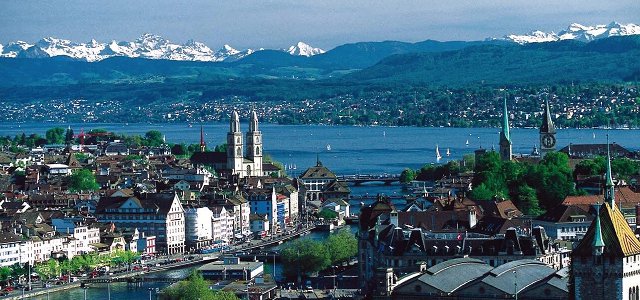The City of Zürich’s Environmental Department says that the town is moving further away from the target it adopted in 2008 in a referendum.

Germany has its Energiewende; Zürich, the 2,000-Watt Society. (Photo by MadGeographer, CC BY-SA 3.0)
One of the amazing things about German energy policy is that it has a brand – the Energiewende. Other countries are also doing things, but they don’t have a catchy neologism as a label. One concept for an energy transition that deserves better recognition and has a brand is the 2,000-Watt Society.
A few years ago over at the New Yorker, Elizabeth Kolbert provided a nice overview of the concept and its history, which is Swiss. Basically, the idea is that we all have a budget. The point of having a budget is fairness; you take whatever global limit you have estimated and divide it by the number of people on the planet. Globally, we are more used to thinking of a carbon budget, but the Swiss express that in terms of energy consumption. The average is 2,000 watts, which may seem like a lot because we are used to thinking only in terms of electricity. I personally consume around 200 watts of electricity around-the-clock, so you might think I am only at 10 percent of my allowed budget.
You’d be wrong – the energy that goes into the products I consume is counted along with all of my other non-electricity consumption. The gas in my car is counted, as is the energy that went into making my car. And if you fly a lot (I try not to fly at all), you land several times higher than the target. Today, most of Europe is closer to 6,000 watts per capita. Kolbert’s report gives a few examples of what a 2,000-Watt Society would look like. (Suffice it to say that you will probably not own a car.)
One reason why she published that report in 2008 was the plebiscite in Zürich. In 2008, 76 percent of voters threw their weight behind a policy aimed to make the city a 2,000-Watt Society by 2050. As the Swiss press now reports (in German), the city is not moving in the right direction, however. In 2012 – which is apparently the last year for which data are available – consumption rose to 4,266 watts from 4,195 in 2010. Note, however, that the level was closer to 5,000 watts in 1990.
As the article shows, the discussion now revolves around the inaccuracy of the count. Indeed, at the level of a single city, it is hard to draw clear distinctions about energy consumption. The tolerance zone is incredibly large; if the “grey energy” that goes into the provision of products and services is properly taken into account, critics argue that the city’s per capita consumption rises to 6,000 watts – and 8,000 for the country as a whole. In other words, the entire campaign is an exercise in energy auditing.
Proponents of the campaign argue that the slight increase from 2010 to 2012 is therefore nothing to worry about because it is within the tolerance range (to put it mildly). They also point out that the target is long-term, and small fluctuations will naturally occur on the way.
The target itself is especially interesting in terms of nuclear. While one could imagine a share of nuclear within the 2,000-Watt Society, it turns out that the official campaign is quite clear on the matter – there is no place for nuclear. As the City of Zürich’s puts it in a PDF explaining the campaign,
“with efficient energy use and renewable energies, we can abandon nuclear power, making Zurich environmentally friendly, climate-friendly and very well prepared for a future in which the scarcity of resources will play an increasingly major role.”
Proponents of nuclear rally around carbon budgets, and some of them are fierce critics of efficiency, promising instead an energy-rich future with nuclear power. It is interesting to note how uncomfortably efficiency and nuclear power lie with each other. Frequently, the nuclear camp rejects efficiency, and the efficiency camp rejects nuclear.
Craig Morris (@PPchef) is the lead author of German Energy Transition. He directs Petite Planète and writes every workday for Renewables International.
I just don’t get it. ‘Watt’ is a unit of POWER, but the article discusses ENERGY, which is expressed in term of ‘Watt-hour’ or Wh. I read the article in German and the same thing is repeated. What is the “2,000 W society”? Does it mean the average peak power consumed by the whole city of Zurich should not be more than 2,000 W? Is the average peak power for a day, a week, a month or for a whole year? Or was it a type and the actual thing is “2,000 kWh”? Did I miss something?
Btw, the annual average ENERGY consumption per capita from the tropical and developing country I live in is around 2,920 kWh and daily per capita is 8 kWh.